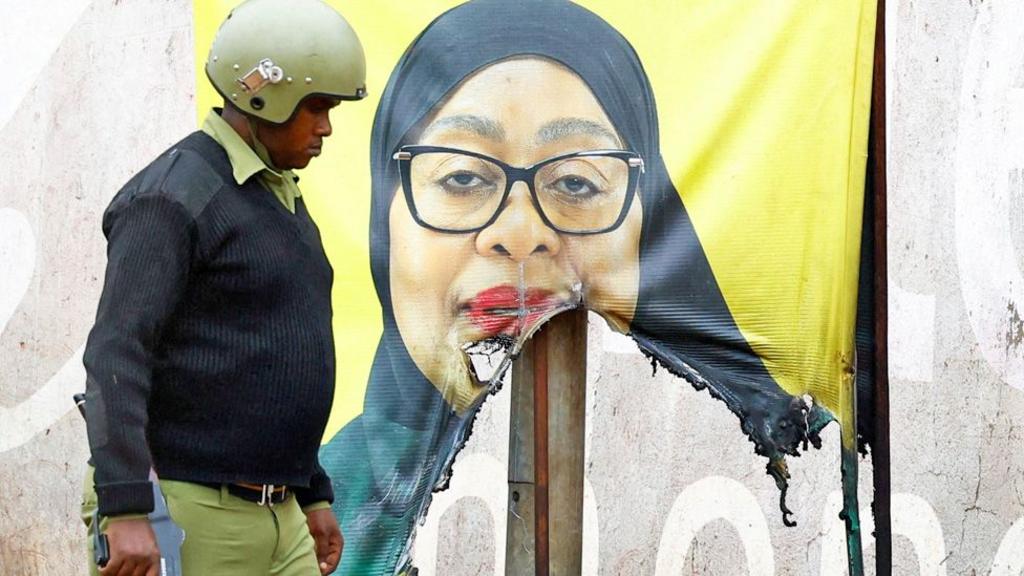Tanzania’s primary opposition party alleges that hundreds have been killed during three days of protests following Wednesday’s general election.
A spokesperson for the Chadema party informed AFP that “around 700” individuals have reportedly died in clashes with security forces. A nationwide internet shutdown is hindering verification of the reported fatalities.
The BBC has consulted a diplomatic source in Tanzania who stated that there is credible evidence indicating at least 500 deaths.
However, a government minister defended the government’s response to the unrest, stating that “nobody can state how many were injured”.
Demonstrations have occurred in major cities, with young protesters condemning the vote as unfair, citing the barring of key opposition figures from running against President Samia Suluhu Hassan.
Foreign Minister Mahmoud Kombo Thabit described the events as “a few isolated pockets of incidents here and there… our security forces acted very swiftly and decisively to address these situation,” in an interview with BBC Focus on Africa TV.
“We are [also] continuing to receive the reports of the vandalised properties,” the minister stated, adding that the internet blackout was necessary to prevent further vandalism and save lives.
Protests persisted on Friday in Dar es Salaam, specifically in the Salasala, Yombo, and Tegeta neighborhoods, as demonstrators defied warnings from the country’s army chief to cease the unrest.
“Some people went to the streets on 29 October and committed criminal acts. These are criminals and the criminal acts should be stopped immediately,” Gen Jacob John Mkunda stated on state TV on Thursday, adding that the army had “controlled the situation.”
The government has sought to downplay the extent of the violence, and authorities have extended a curfew in an attempt to quell the unrest.
The internet shutdown has made it difficult for journalists and human rights organizations to verify the reports of deaths.
Hospitals in the country have reportedly been withholding information regarding casualties.
A source at a referral hospital in Dar es Salaam told the BBC that it has been overwhelmed with casualties since Thursday.
The source further indicated that similar situations were reported at other public hospitals in the city, with morgues allegedly at capacity.
A Chadema politician expressed concerns to the BBC about his safety, alleging that “massacres are carried out during night hours when no-one is there to witness them.”
“They are tracking down all our leaders and some have had to leave the country. These people kill with impunity,” John Kitoka, Chadema’s director of foreign and diaspora affairs, told the BBC’s Newshour program.
The United Nations has urged Tanzanian security forces to refrain from using unnecessary or disproportionate force.
“We are alarmed by the deaths and injuries that have occurred in the ongoing election-related protests in Tanzania. Reports we have received indicate that at least 10 people were killed,” Reuters quoted UN human rights spokesperson Seif Magango as saying earlier on Friday.
The BBC understands that ambassadors from several foreign embassies have engaged the Tanzanian government to urge restraint from security forces in policing the protests.
By late afternoon on Friday, the electoral commission had announced results from approximately 80 of the country’s 272 regions, according to the state broadcaster TBC.
The BBC has learned that international observers reported an incredibly low turnout during Wednesday’s polling.
President Samia is widely expected to secure victory under the ruling Chama Cha Mapinduzi (CCM) party, which has governed the country since independence in 1961.
Official results are anticipated on Saturday.
In Zanzibar, Tanzania’s semi-autonomous archipelago which elects its own government and leader, the CCM’s Hussein Mwinyi, the incumbent president, won with nearly 80% of the vote.
The opposition in Zanzibar has alleged “massive fraud,” according to the Associated Press news agency.
Tourists on the island are also reportedly stranded at the airport, experiencing flight delays due to the mainland protests and the internet shutdown.
A Kenyan music publicist reported being stranded in Tanzania for three days due to the communication disruptions.
“Internet, shops, petrol stations, email, social media, everything was down. Total disconnect. No international or regional calls in or out. No text messages in or out. There were no Ubers or Bolts available because there was no network,” Anyiko Owoko posted on Instagram after returning home on a Kenya Airways flight on Friday.
“Many flights were cancelled, Tanzania’s national airline was grounded. There were so many people stranded at the airport who couldn’t book tickets or reschedule flights because of the connectivity blackout,” she added.
Protesters accuse the government of undermining democracy, pointing to the imprisonment of main opposition leader Tundu Lissu and the disqualification of another opposition figure from the election, which strengthened Samia’s chances of victory.
Lissu is being held on treason charges, which he denies, and his party boycotted the vote.
The only other significant contender, Luhaga Mpina of the ACT-Wazalendo party, was excluded on legal technicalities.
Sixteen fringe parties, none of which have historically had significant public support, were cleared to contest the elections.
Samia ascended to power in 2021 as Tanzania’s first female president following the death of President John Magufuli in office.
She initially received praise for easing political repression, but the political climate has since tightened, with her government facing accusations of targeting critics through arrests and a wave of abductions.
Additional reporting by Stewart Maclean and Basillioh Rukanga
Go to BBCAfrica.com for more news from the African continent.
Follow us on Twitter @BBCAfrica, on Facebook at BBC Africa or on Instagram at bbcafrica
El-Fasher is under the control of paramilitaries accused of mass executions and crimes against humanity.
Pretoria rubbishes claims of a white genocide and quotes prominent Afrikaners who dub Trump’s plans racist.
Some are warning of a genocide unfolding in Darfur – violence that is linked to killings there 20 years ago.
The court sets aside the 1967 inquest that found that the anti-apartheid hero was hit by a goods train.
Harrowing accounts from people who have escaped an RSF assault on the besieged city of el-Fasher.

